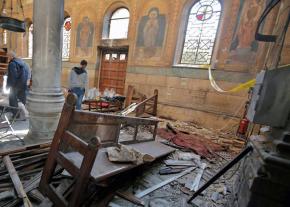Down with terrorism, sectarianism and tyranny
A bomb exploded in the main Coptic Christian cathedral in Cairo on December 11, killing at least 24 people and injuring dozens more. The explosion, which Egyptian authorities say was set off by a suicide bomber, targeted a section of the church reserved for women, so the victims were mostly women and children. Islamist groups, including the one-time ruling Muslim Brotherhood, have targeted Copts for persecution in the past. But the military regime--both before the fall of Hosni Mubarak and since the coup that brought Gen. Abdul-Fattah el-Sisi to power--has both tolerated sectarian violence against the Christian minority and maintained discriminatory policies and practices.
The issued the following statement condemning both the terrorist acts in Cairo and the tyranny of the military regime--an English translation of the statement first appeared on the RS website.
THE ABHORRENT crime that took the lives of 24 Copts, mostly women and children, shows the criminal and sectarian nature of the terrorist groups who have always targeted Copts and religious minorities. This attack also reveals the indifference of the authorities and their security forces towards the safety of the Copts.
The security forces that suppress any form of free expression or protest, roam the streets and neighborhoods day and night looking for their opponents and are quick to mobilis their thugs to counter any form of peaceful protest neglect to protect the Copts and Christian places of worship, despite their prior knowledge that they are a prime target for terrorist groups.
Those who use terrorist methods deny the masses any role in bringing about change, and therefore ultimately and inevitably end up targeting the masses themselves, putting themselves--intentionally or not--at the service of the despotic and oppressive regime.
The blood of the church's martyrs is yet to dry but the regime's mouthpieces are already exploiting it, calling for an increase in the number of military trials, the application of emergency law and amendments to the criminal law, as if the regime needed yet more means for oppression and tyranny.

Terrorist groups, not content with killing the innocent, also provide despotic regimes with more justifications for repression, persecution and the suppression of any mass action under the pretense of fighting terrorism.
But the ordinary people gathered at the scene who refused to welcome regime figures and pro-regime journalists yesterday have shown that they are most conscious of the fact that terrorism and repression are, in fact, two sides of the same coin. Their chants echoed those of the 2011 revolution, condemned al-Sisi and held him responsible for the attack.
The last few years have proved that the counterrevolutionary regime's use of religious rhetoric and its exploitation and manipulation of religious institutions does not differ from the use of these tactics by Islamist groups. The sectarianism which the Copts suffer from under the shadow of religious groups is the same as the sectarianism of the counterrevolutionary regime, which is complicit in attacks on Coptic homes and monasteries in Upper Egypt, in assaults on Coptic women, and in forcing families to flee their country. The same regime is also responsible for delaying legislation on places of worship, and for the sectarian model which this law has followed.
Day after day shows us all that the Copts of Egypt will never win their rights under dictatorship, but only if there is justice and genuine democracy.
The real battle against terrorism and sectarianism cannot be separated from the battle against dictatorship and social injustice. Any compromise with the dictatorship in the hope of protecting minorities will only bring more sectarianism, terrorism and tyranny.
First published at the Revolutionary Socialists website.




